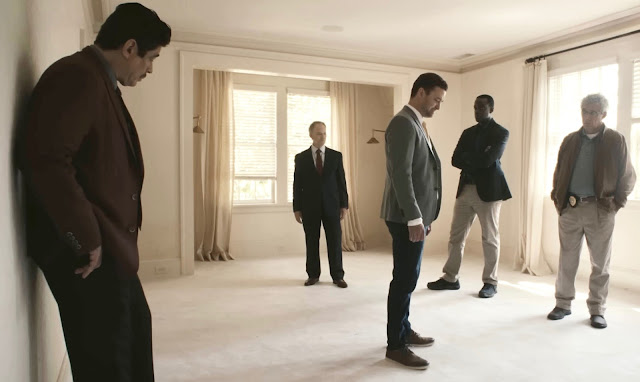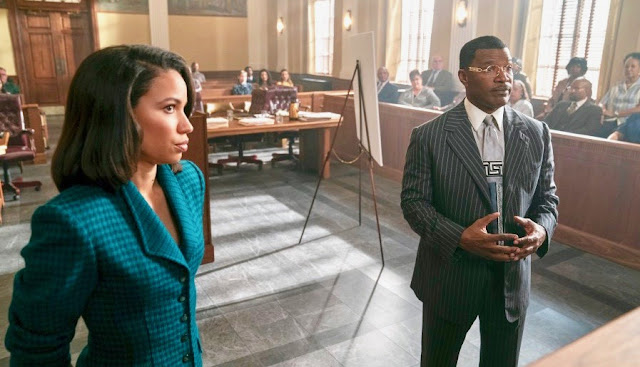I Suspect an Abundance of Suspects
Review and Comments by Ken Burke
I invite you to join me on a regular basis to see how my responses to current cinematic offerings compare to the critical establishment, which I’ll refer to as either the CCAL (Collective Critics at Large) if they’re supportive or the OCCU (Often Cranky Critics Universe) when they go negative. However, due to COVID concerns I’m mostly addressing streaming options with limited visits to theaters, where I don’t think I’ve missed much anyway, but better options are on the horizon. (Note: Anything in bold blue below [some may look near purple] is a link to something more in the review.)
My reviews’ premise: “You can’t please everyone, so you got to please yourself.”
(from "Garden Party" by Rick Nelson and the Stone Canyon Band, 1972 album of the same name)
Before I start delving into my newest cinematic commentary, I know you don’t turn to a movie-review-blog for political opinions (although that doesn’t keep me from making the occasional jab at Donald Trump, especially as some of his Georgia co-defendants keep turning on him, along with his ex-lawyer, Michael Cohen, in his NY charges), nor do I want to start any debate here on what’s currently happening in Israel and Gaza or Ukraine, but no matter how you might feel about what’s going on in those troubled regions at present you might want to make a donation (or 2, or 3) to help the embattled civilians in those conflicts, so I’ll pass along charities I’ve just donated to in case you might want to do the same (or choose other places where you can send your aid). I went with the Red Cross on behalf of Israel, Doctors Without Borders for the Palestinians in Gaza (not the Hamas terrorists), and Amnesty International for Ukraine (nothing for Russia, as I have no sympathy for Putin’s uncalled-for-invasion). Those concerns aside, I'm onward to this week’s review.
Here’s the trailer:
(Use the full screen button in the image’s lower right to enlarge its size;
activate the same button or use “esc” keyboard key to return to normal.)
If you can abide plot spoilers read on, but this blog’s intended for those who’ve seen the film or want to save some $ (as well as recognizing those readers like me who just aren’t that tech-savvy). To help any of you who want to learn more details yet avoid these all-important plot-reveals I’ll identify any give-away sentences/sentence-clusters with colors plus arrows:
⇒The first and last words will be noted with arrows and red.⇐ OK, now continue on if you prefer.
What Happens: In Scarsborough, Maine we find realtors Will Grady (Justin Timberlake) and his partner/girlfriend Summer Elswick (Matilda Lutz), whom (we later learn) he says he intended to propose to once her divorce is finalized from Sam Gifford (Karl Glusman), although these lovers are at odds with each other in this opening scene. Later, at night, Will gets puzzling texts from Summer so he goes to the lavish house we previously saw them in, finds her dead from multiple stab wounds. This gruesome murder brings an investigation from police detective Tom Nichols (Benicio Del Toro) and his partner, Dan Cleary (Ato Essandoh); when they’re shown at a party to honor Tom’s wife's (Judy [Alicia Silverstone]) uncle, Captain Robert Allen (Eric Bogosian), we also meet Police Chief Marty Graeber (Mike Pniewski) and pushy cop-detective Wally Finn (Domenick Lombardozzi). Later, we get the not-fully-clarified-info that Tom had problems at his previous job in Philadelphia because his partner was involved with drugs, ambiguous implications Tom might be tainted too although none of his behaviors indicate such. Tom questions Will who argues he couldn’t be the killer because he truly loved Summer; instead, he throws suspicion on troubled Eli Phillips (Michael Carmen Pitt), who holds a grudge against Will and his mother, Camille Grady (Frances Fisher), because Will’s father’s real estate company, years ago, involuntarily bought the Phillips’ farm, which had been in their family since the 1930s, leading to Eli’s father’s suicide. Eli claims Will killed Summer, but the only evidence the cops have is some inconclusive video footage of a car near the house on murder-day which Cleary says is a 1990 Buick LeSabre but Judy correctly identifies it as a Chrysler Imperial, yet Tom and Dan can find no trace of such a car. To further complicate things, it’s seems Summer was also raped, with DNA evidence traced to her almost-ex, Sam, but then we get info from Summer’s friend, Renee (Sky Ferreira), Summer was still having sex with Sam on the sly.
When Tom and Dan go to arrest Sam, he grabs Dan’s gun, tries to escape, but is shot dead by Tom, so Dan’s considered to be Summer’s killer (Tom’s not so sure), Tom’s going to be recommended for the Medal of Valor for saving Dan from harm. The complications continue as Eli comes to Tom’s house but is held at gunpoint by Judy until Tom arrives home. Eli’s arrested for the intrusion but manages to give Tom a flashdrive with what he says is evidence of an illegal scheme by Will and Camille to plant drugs in houses allowing the properties to be seized by the police, then sold at a great bargain to the Gradys under a shell company, White Fish, also connected to Wally’s private security company; Summer became aware of this, says Eli; she was going to report it to the DEA so she was killed. ⇒Then, at a birthday party for Capt. Allen, Tom finds a Chrysler Imperial with a new paint job in Allen’s garage, confronts him about all this, agrees to meet with him the next day for an explanation. Tom tells what he knows to Chief Graeber so they go together to Allen’s home, but Marty excuses himself to the bathroom. Allen pleads with Tom to get out, then he’s shot dead (by either Marty or Wally [he’s there too], as they’re all in on the scam). Marty tries to kill Tom, although he manages to terminate both Marty and Wally, then he reports all this to the FBI (as he doesn’t trust any of the local police), with one of the final shots showing them arresting Will because Wally was the one who initially attacked Summer (it was his car hidden in Allen’s garage), although she wasn’t dead yet when Will showed up that night so he finished her off, surely showing his story about wanting to marry her was just a red herring to put the cops off of his trail.⇐ The actual ending shot is much more peaceful, though; happens in Tom’s renovated kitchen where he’s delighted to see the successful installation of a faucet that responds to hand movements (like those Clapper lamps of days gone by, still available from many sources today if you’re interested in this interactive-device).
So What? The first thing you might want to know about this convoluted-but-intriguing-film is what the title refers to. I couldn’t come up with an answer, turned to director/co-screenwriter (with Benjamin Brewer, del Toro) Grant Singer: “ ‘In the movie, characters are introduced as one thing and revealed to be something else,’ Singer continues. ‘There’s a shedding of skin that occurs, and it felt like an appropriate metaphor for the film. Some of the most unethical people in the film can be very likable in moments.’ Like anything with cold blood, these reptiles can be perfectly warm under the right circumstances.“ (The article with this quote's informative but has Spoilers; if it was useful, also consider this recap video [10:20; ads interrupt at 3:16, 8:00] which is like my summary above but illustrated throughout—obviously, Spoilers here too—yet doesn’t really get too much into explaining the ending.) The next thing you might want to know if you’ve seen some of the many negative reviews this film's received (see the next section of this review), is why should you consider watching it when the critical community (although, not me as part of that) is so uniformly-dismissive?
Ultimately, you’ll have to decide that one for yourself, but I find this film to be an enjoyable watch of a murder mystery where there are enough viable suspects as perpetrators to keep it mysteriously-interesting. (Not that I’m all that good at determining the guilty party in stories like this before the climactic-revelation, as evidenced by my wonderful wife, Nina, and I watching a weekly dose of revisits to the old PBS series, Midsomer Murders, where someone’s usually killed within the first few minutes, then almost-too-many-characters are introduced for me to successfully keep up with so when I try to predict who the killer is I’m usually wrong, but the show’s still fun.) I’ll also say the acting—especially by Del Toro—in Reptile is well-done, as is the cinematography and the pacing, so you always have something going on to keep your interest. Some might say a bit too much going on regarding the initial 3 suspects where possible-guilt seems to shift among them quickly (although in retrospect, we’re given what we need to know at about the middle of the running time, yet it’s not clear we should believe it, only adding a bit to the plot’s complexity). Once the film is done, you could easily say there are at least 3 other suspects who supposedly are Tom’s working buddies (one’s even an in-law), maybe 4 given hints about Dan being dirty, but that’s only speculation. Maybe I’m just used to this complexity from my steady-diet of Midsomer Murders, but ultimately I found Reptile to be quite enjoyable in its twists and turns, think many of you would respond similarly.
Bottom Line Final Comments: An increasingly-standard-ploy of distributors is opening their product in a limited number of domestic (U.S.-Canada) theaters so as to comply with later awards-consideration-mandates; Reptile had such a limited release on September 22, 2023 but made its more-intended-debut on Netflix streaming a week later. Because Netflix doesn’t report receipts from these short-term-theatrical-screenings I have no idea how much it made at the box-office (nor does it still seem to be playing, at least in my San Francisco Bay Area), but given the competition in the weeks since it’s been out its only chance might have been when it opened as the top domestic option then was The Nun II (Michael Chaves)—in its 3rd week, pulling in only $8.5 million—after which it had to contend with the debuts of PAW Patrol: The Mighty Movie (Cal Brunker, 9/29/23) opened with $22.8 million, The Exorcist: Believer (David Gordon Green, 10/6/23) with $26.5 million, Taylor Swift: The Eras Tour (Sam Wrench, 10/13/23) with $92.8 million, and Killers of the Flower Moon (Martin Scorsese, 10/20/23) with $23 million (also last weekend Taylor Swift … continued to rule the domestic market: $31 million more), so whatever notice Reptile gets likely comes from streaming—if it gets noticed, as the OCCU offers scant support: Rotten Tomatoes positive reviews a paltry 44%, Metacritic average score (slightly higher for a change) at 52%.
I clearly liked it better than that—as does Richard Roeper of the Chicago Sun-Times: “Filmmaking is such a collaborative process we hesitate to say any individual, even the lead, carries a movie, but that’s exactly what Benicio Del Toro does as a world-weary detective in the seedy and lurid cop-noir ‘Reptile’: He carries this sometimes convoluted and derivative thriller into three-star territory [of 4] with an absolutely mesmerizing and authentic performance that conjures up memories of past anti-hero greats such as Bogart and Mitchum, Robert Ryan and Sterling Hayden. It’s authentic, grounded, stunning work. [¶] Even when the material is the stuff of B-movie guilty pleasure.“—but the majority opinion of most critics is well-expressed by Natalia Winkelman of The New York Times: “The trouble with ‘Reptile’ is that this impressive moment-to-moment control does not extend to the contours of the broader story, which the writers overstuff with clumsy twists and contrived devices. Once the film gets around to revealing the culprit, we have already lost interest, enervated in the face of a movie that, like an overeager snake, bites off far more than it can swallow.” No hope there!
So, if you’re a Netflix subscriber you can watch Reptile for free; if not, you could get a 1-month-sign-up for $6.99 (with ads) or $15.49 (without ads) which also gives you 30 days of access to everything else on their platform (no matter to me, Two Guys gets no kickback for subscriptions). Over these next couple of weeks I’ll continue looking for streaming options for you while waiting for crowds to ease off at my neighborhood theaters so I can see and review Killers of the Flower Moon with minimum-COVID-paranoia; in the meantime, here for your aural pleasure is my choice for a Musical Metaphor to wrap up these comments on Reptile, Bob Dylan’s “Knockin’ on Heaven’s Door” (on the 1973 soundtrack album for Pat Garrett & Billy the Kid [Sam Peckinpah]) at https://www.youtube. com/watch?v=rm9coqlk8fY (as a bonus, here’s how it’s used in Pat Garrett ...), an easy choice because it’s in Reptile’s soundtrack under the final credits. While detective Tom Nichols (unlike Sheriff Colin Baker [Slim Pickens] in Peckinpah’s film, dying in sync with the song’s lyrics) isn’t facing death, I have to wonder—given the experiences he’s had with police forces in both Philadelphia and Maine—how much tolerance he has to continue being a cop, even though he says he loves the profession nearly as much as he loves his wife. While we don’t see him throw away his badge at the end of this story, as do the frustrated lawmen in High Noon (Fred Zinnemann, 1952), Dirty Harry (Don Siegel, 1971)—although Harry does return to the force—and the sequel to Shaft (John Singleton, 2000), Tom certainly has reason to think “ ‘Mama, take this badge off of me / I can’t use it anymore […] Mama, put my guns in the ground / I can’t shoot them anymore.’ ” Tom probably does sense something similar to “That long black cloud is comin’ down / I feel like I’m knockin’ on heaven’s door” by the time the events of Reptile are concluded, as all of the deceptive skins have been shed.
SHORT TAKES
Related Links Which You Might Find Interesting:
Some options for your consideration: (1) Killers of the Flower Moon opens big, but Taylor Swift: The Eras Tour stays on top domestically; (2) ... Flower Moon tops ... Eras Tour internationally; and (3) Writers Guild of America West apologizes for its silence on Hamas attack on Israel.
We encourage you to visit the Summary of Two Guys Reviews for our past posts* (scroll to the bottom of this Summary page to see additional info about your wacky critic, Ken Burke, along with contact info and a great retrospective song list). Overall notations for this blog—including Internet formatting craziness beyond our control—may be found at our Two Guys in the Dark homepage. If you’d like to Like us on Facebook (yes?) please visit our Facebook page. We appreciate your support whenever and however you can offer it unto us! Please also note that to Post a Comment below about our reviews you need to have either a Google account (which you can easily get at https://accounts.google.com/NewAccount if you need to sign up) or other sign-in identification from the pull-down menu below before you preview or post. You can also leave comments at our Facebook page, although you may have to somehow register with us at that site in order to do it (most FB procedures are still a perplexing mystery to us old farts).
*Please ignore previous warnings about a “dead link” to our Summary page because the problem’s been manually fixed so that all postings since July 11, 2013 now have the proper functioning link.
If you’d rather contact Ken directly rather than leaving a comment here at the blog please
use my email address of kenburke409@gmail.com—type it directly if the link doesn’t work.
OUR POSTINGS PROBABLY LOOK BEST ON THE MOST CURRENT VERSIONS OF MAC OS AND THE SAFARI WEB BROWSER (although Google Chrome usually is decent also); OTHERWISE, BE FOREWARNED THE LAYOUT MAY SEEM MESSY AT TIMES.
Finally, for the data-oriented among you, Google stats say over the past month the total unique hits at this site were 57,916 (as always, we thank all of you for your ongoing support with our hopes you’ll continue to be regular readers); below is a snapshot of where those responses have come from within the previous week (with appreciation for the unspecified “Others” also visiting Two Guys’ site):
























